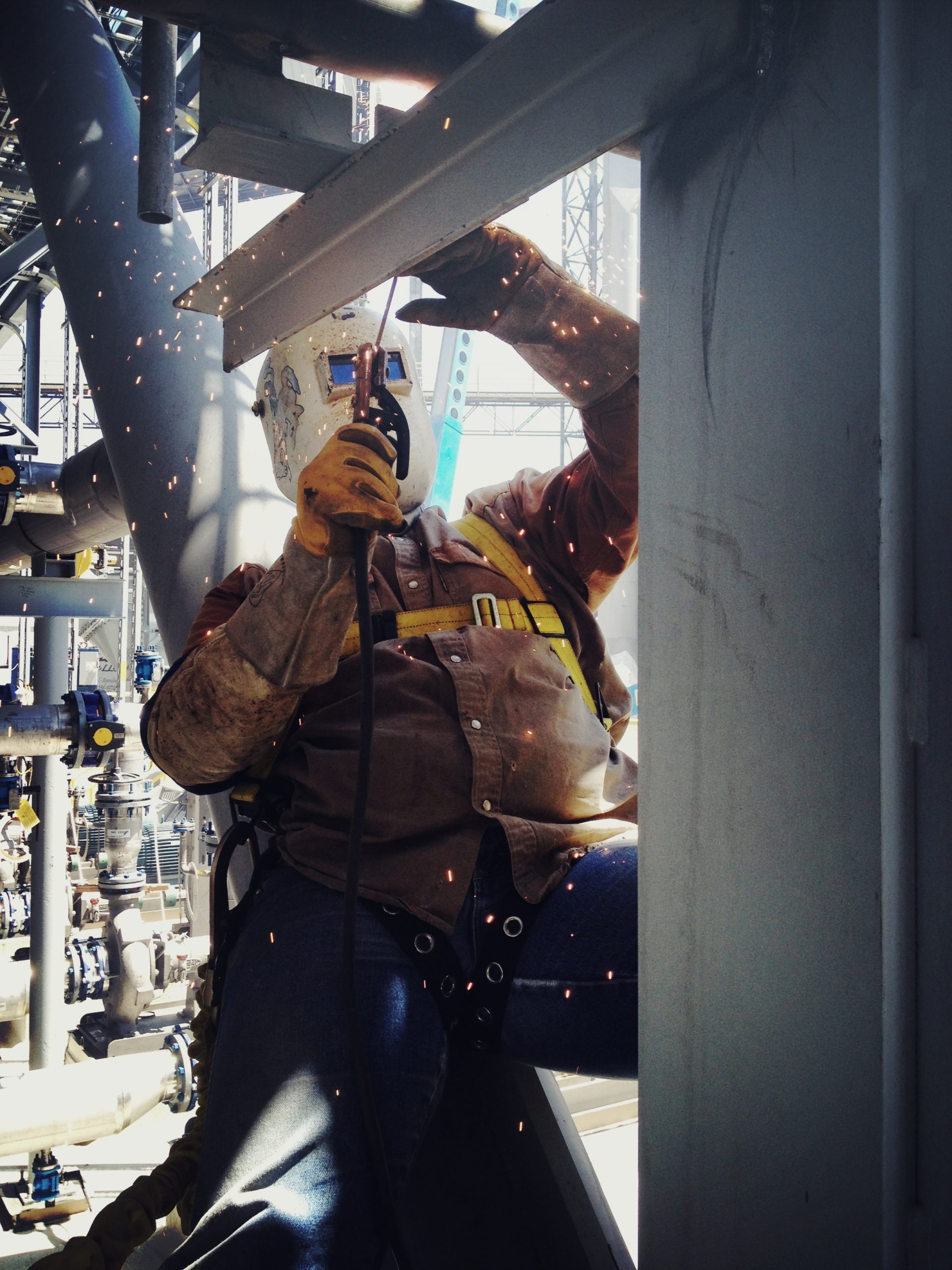In this episode, we talk about the different jobs available in the oil and gas industry and how much they get paid. We discuss how many of the jobs based in the field do not require a 4-year degree and how these skilled trades are needed to ensure cheap and reliable access to energy. We also dive into the impact of the oil and gas industry on the US economy.
Be sure to also subscribe on Apple Podcasts via the link above and please leave us an honest rating and review. We read every one of them and sincerely appreciate any feedback you have. To ask us a question to be featured on an upcoming episode, please leave a comment below or send an email to feedback@mineralrightspodcast.com.
Jobs on a Drilling Rig
To find out more, read the book Roughnecks, Drillers, and Tool Pushers: Thirty-three Years in the Oil Fields (Personal Narratives of the West) by Gerald Lynch – features Justin’s great uncle Jake and what life was like in the oilfields in and around Texas in the 1920’s-1950’s..
- Roughneck/Roustabout – unskilled or semi-skilled manual workers who take care of maintaining the rig. Typical duties include, painting, cleaning, clearing safety hazards, lifting & moving equipment and tools around the rig. They usually make around $30-40k/yr.
- Motorman/mechanic – keep all of the rig equipment running smoothly, especially engines. Maintaining equipment, making sure replacement parts are on hand for the engine, etc. Average wages/salary: $40k+
- Derrickman – this is for the person who is not afraid of heights – spends time on the monkey board on the derrick which is a wooden plank up near the top. They are responsible for managing the drilling string (the drill pipe joints that are connected together are called the drilling string). $40k
- Driller – this is the supervisor of the drilling rig team. They are responsible for operating the rig and monitoring the equipment and gages. Makes $50-60k/yr.
- Above the driller is the rig manager or toolpusher. They have the highest supervisory position on the rig with the drilling contractor that owns the rig. They manage and oversee everything that happens on the rig, especially around ensuring safety, handling administrative tasks, plus have working knowledge of all the jobs on the rig (they’ve usually done them all at one point or another). Their average salary is $90-100k/yr. This is a job doesn’t require a college degree but requires years of experience working on a rig.
- Company Man/ Drilling Supervisor – the Toolpusher’s counterpart that works for the oil and gas operator that has contracted the company to drill the well. They represent the company’s interests and liaise with office staff within the oil and gas company, like the drilling engineer
- Drilling Engineer – within the oil and gas company, they are the ones that put together the drilling plan which is also called the Drilling Prog (short for program). This is the engineering plan for constructing the wellbore, including the casing plan, drilling mud design, well control plans, drill bit selections, engineering calculations like pore pressure estimations, and cost estimates, plus any special procedures. Need to be able to think on your feet – “No battle plan survives contact with the enemy” (quote from German military strategist Helmuth von Moltke) – in other words, things change once you start work.
- Other Engineering, Supervisory, and management positions within both the drilling contractor/service company and the oil and gas company. Within service company there are also very specialized positions like cementing engineer who is the person in charge of the cementing crew, materials, and equipment who oversees cementing the casing into the wellbore. Drilling mud or drilling fluid engineer, this is the person who is responsible for testing the drilling mud used on a rig and any treatments and additives necessary to maintain a certain mud weight and mud properties to ensure safe drilling so that there is not a blowout and that the rig can drill as efficiently and effectively as possible.
Well Completions Jobs
Well completions refers to the process, material, and equipment to safely maximize production from an oil and gas well. One of the most common completions techniques used today is “hydraulic fracturing” which consists of pumping high pressure water, sand, and chemicals into the wellbore in order to open up microfractures in the formation to allow oil and gas to flow into the wellbore where it can then travel up the downhole tubing to the wellhead and surface equipment where it can be treated, transported, and sold.
Typical completions jobs include:
- Completions Engineer
- Completions Supervisor
- Workover Rig Supervisor
- Workover Rig Crew – floorhand/operators/mechanics
Production Operations and Maintenance Jobs
- Production Engineer – responsible for monitoring well performance and designing & specifying the artificial lift equipment required to maximize production. This may include things like beam pumps (affectionately known as pump jacks), gas lift, electrical submersible Pumps (ESP’s), plunger lift for gas wells. Basically – they help make sure that the well keeps producing oil and gas and that they manage produced water to ensure that the well doesn’t load up and stop producing. They identify wells that are not performing to standard and put a plan together to workover a well. Might be things like a hole in the tubing, paraffin build up, etc. They work with the completions team and contractors to execute any well intervention/workers in the field.
- Production Technician – supports the production engineer, runs reports, does basic analysis in engineering software, may help with well surveillance, etc.
- Specialized contractors – workover rigs, slickline units, wireline units, coiled tubing, chemical treatment, etc. – plus all the personnel to operate and maintain this equipment in the field.
Oil and Gas Facilities Jobs
- Facilities Engineer – responsible for designing and specifying production equipment like tanks, separators, dehydrators, flow meters
- Electrical Engineer – responsible for power and instrumentation at wellsite. Includes power distribution for pumps, compressors, etc. and instrumentation and control systems/automation so that the equipment operates safely and reliably.
- Project Engineers – responsible for larger capital projects like centralized processing facilities, compressor station design and installation, pipeline design and installation.
- Reliability and Rotating Equipment Engineers – look after rotating equipment
- Corrosion and Pressure Equipment Engineers – specialize in safe and reliable design and operation of pressure vessels, piping, etc.
- Operators/Pumpers – folks visit wellsites to check on wells and facilities to ensure that they are operating within specifications. Check temperatures, pressures, flow rates, make sure any chemicals are stocked up (e.g. gas wells they may use methanol injection to ensure that gas hydrates do not form and freeze off surface piping), check fluid levels in tanks.
- Maintenance Technicians and Mechanics – execute routine and corrective maintenance in the field. This includes piping inspections, rotating equipment maintenance, lubricating equipment, corrosion control (e.g. painting, etc.)
Trades
The oil and gas industry employs many trades not directly related to drilling, completing, or other specialized roles. For example, they employ:
- Welders
- Electricians
- Pipe Fitters
- Paint and coating specialists
- and other General Laborers just to name a few
Indirect Jobs to the Oil and Gas Industry
In addition to the people directly employed in the industry, there are millions of people who provide support to the industry through the products or services that they provide. For example, the industry uses a lot of piping, electrical equipment, pumps, compressors, paint/coatings, insulation, buildings, structural steel, concrete, earthworks, trucking, catering, etc. The companies and people that manufacture the piping, pumps, compressors, pipe valves & fittings, electrical cable, wire, instrumentation, and ancillary equipment are all indirectly impacted by the economic activity that results from producing oil and gas and associated products. Many of these things have uses outside of just oil and gas but the economic impact from the procurement and maintenance of these things is large.
The indirect impact of the industry essentially refers to all of the things throughout the supply chain of the oil and gas industry that make up the capital expenditures and operations and maintenance expenses.
Some of the less obvious examples of this are the large number of hotel and motel rooms that are booked by workers when they stay in an area where the work is (whether drilling or completing a new well, performing maintenance on wells or equipment, or working on a large capital project like a pipeline or gas plant). All of these workers also need to eat and also spend money in the local economy while they are there – simple as getting a haircut, filling up their truck at the local gas station, eating at a local restaurant, letting off steam at the local bar.
The Economic Impact of the US Oil and Gas Industry
According to a PricewaterhouseCoopers LLP report for 2019, the US oil and natural gas industry has a “widespread economic impact throughout all sectors of the economy.” Specifically, the industry employs both directly and indirectly more than 11.3 million people with a combined labor income of $892.7 billion in 2019. The value added contribution to the economy is even more stunning. Value added refers to “the industry’s portion of US gross domestic product (“GDP”)” and in this category, the impact of the US oil and natural gas industry was over $1.687 trillion in 2019.
As you can imagine, most of this impact is felt in the states with the highest employment supported by the oil and gas industry. At the top of the list, Texas employed a total of over 1.5 million people who made a combined $162.9 billion in 2019. California was next with over 399,400 jobs and $34.1 billion in labor income. Other notable states include Pennsylvania, Oklahoma, Colorado, Louisiana, and Ohio. Many others also felt a significant economic impact as a result of the Onshore Upstream Oil and Natural Gas Industry in 2019.
The Impact of Skilled Labor
As you can imagine, the oil and gas industry consists of many hard working folks who work as skilled laborers or trades people, like electricians, welders, pipefitters, just to name a few. In fact, I think many of the highest paying jobs within these trades are likely found in the oil and gas industry in the US. To help raise awareness of the importance of the hard working people that help keep our country running, check out the Mike Rowe WORKS Foundation. Mike Rowe (from the show “Dirty Jobs” amongst other things) is on “a mission to help close the skills gap by challenging the stigmas and stereotypes that discourage people from pursuing the millions of available jobs. We’re redefining the definition of a good education and a good job, because we don’t think a four-year degree is the best path for the most people. We want people to understand the impact of skilled labor on their lives, and we’re convinced that the solution has to start with a new appreciation for hard work.”
His important work is due to the realization that “America has become slowly but undeniably disconnected from the most fundamental elements of civilization—food, energy, education, and the very nature of work itself.”
Resources Mentioned in This Episode
- Roughnecks, Drillers, and Tool Pushers: Thirty-three Years in the Oil Fields (Personal Narratives of the West) by Gerald Lynch – features Justin’s great uncle Jake and what life was like in the oilfields in and around Texas in the 1920’s-1950’s
- The Schlumberger Oilfield Glossary
- The Mike Rowe WORKS Foundation. If you are addicted to “paved roads, working electricity, and flushing toilets” like Mike Rowe, check it out!
- Impacts of the Oil and Natural Gas Industry on the US Economy in 2019 – PricewaterhouseCoopers LLP (pwc) report prepared for the American Petroleum Institute.
- US Bureau of Labor Statistics data on the Oil and Gas Extraction subsector
- The 10 Highest Paying Jobs in Oil and Gas. Many of the jobs require an engineering degree but you may be surprised to find out that two of the jobs on the list don’t require a bachelor’s degree.
- MRP 131: A Brief History of Oil and Gas Innovation. If you want to learn more about how a well is drilled and how technology has changed over the years, then give this episode a listen.
Thanks for Listening!
To share your thoughts:
- Leave a comment or question below (we read each one and your question may be featured in a future episode)!
- Ask a question or leave us feedback via email or voicemail: (720) 580-2088.
To help out the show:
Click the Apple Podcasts Logo Above to leave us a rating & review. It really helps us reach those that need to hear this information and only takes a minute. We greatly appreciate it! Plus, you can get a shout out on a future episode!
Thanks again – until next time!



